- Liana Isakadze
- music genres
- Arturo Márquez Navarro
- Ladislav Kubík
- Igor Kipnis
- McPhee
- Kadiatu Kanneh-Mason
- Black Dyke Mills Band
 VIDEO PODCAST: John Dante Prevedini leads a discussion about The Creative Spark, including contributions from Ryan Ash, Sean Neukom, Adrian Rumson, Stephen Francis Vasta, David Arditti, Halida Dinova and Andrew Arceci.
VIDEO PODCAST: John Dante Prevedini leads a discussion about The Creative Spark, including contributions from Ryan Ash, Sean Neukom, Adrian Rumson, Stephen Francis Vasta, David Arditti, Halida Dinova and Andrew Arceci.
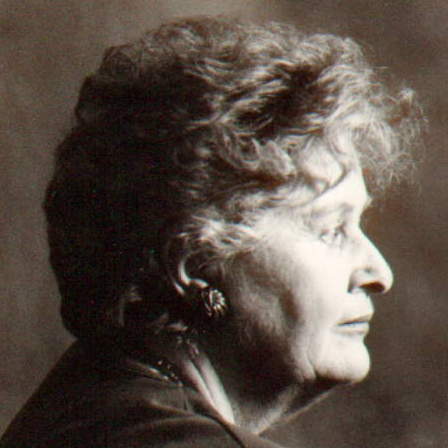 SPONSORED: An Integral Part - Lindsey Wallis looks forward to the Canadian Music Centre's tribute concert to composer Roberta Stephen.
SPONSORED: An Integral Part - Lindsey Wallis looks forward to the Canadian Music Centre's tribute concert to composer Roberta Stephen.
All sponsored features >>
A Ukrainian Star in Rome
Oksana Lyniv makes her Rome debut, experienced by GIUSEPPE PENNISI
Awaiting the Summer Opera and Ballet season (Circus Maximus, Rome, Italy, 15 June-6 August 2021), Teatro dell'Opera di Roma continues the concert series started on 28 April with a Michele Mariotti Verdi concert - reviewed here as 'Teatro dell'Opera di Roma Re-Opens' on 3 May 2021. The concerts feature important conductors such as Gianandrea Noseda, Oksana Lyniv and Alejo Pérez. They are programmed for an audience of only five hundred to allow social distancing. The concerts start at 8pm and last about one hour to comply with the curfew rules whereby, until 21 June, audience members must be home by 11pm. The Prime Minister announced that the curfew will be postponed until midnight on 1 June and entirely lifted on 21 June 2021. Live opera performances can start again.
I selected the 22 May 2021 concert that marked the Rome debut of Oksana Lyniv - a young and accomplished Ukrainian conductor. She is the daughter of two musicians and the granddaughter of a choral conductor. From 1992 until 1996, she studied flute and conducting at the Stanislav Liudkevych Music School in Lviv. She first conducted an orchestra at age sixteen. From 2005 until 2009, Lyniv continued her music studies at the Musikhochschule Dresden. From 2008 until 2013, she was associate chief conductor of the Odessa National Opera. She has worked on establishing a national youth orchestra in Ukraine. Since the 2013-2014 season, Lyniv has served on the conducting staff of Bavarian State Opera, as an assistant conductor to Kirill Petrenko. Her work at the Bavarian State Opera has included conducting productions of Mirandolina (Bohuslav Martinů), Die Soldaten (Bernd Alois Zimmermann), and Selma Ježková (Poul Ruders). She is the first female conductor to be named chief conductor of Graz Opera and the Graz Philharmonic Orchestra - a position she held from the 2017-2018 season until the 2019-2020 season. Her debut in Rome was much awaited.
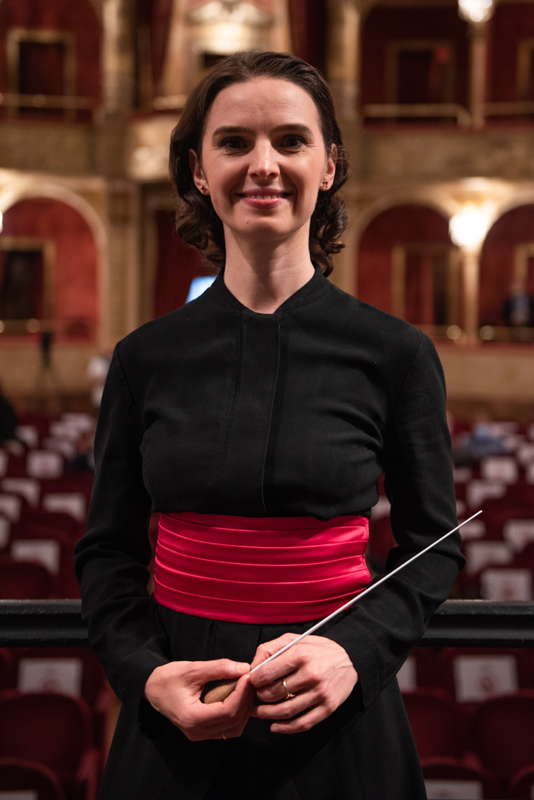
Oksana Lyniv in Rome. Photo © 2021 Fabrizio Sansoni
The concert started with Richard Wagner's Siegfried Idyll and continued with Piotr Ilyich Tchaikovsky's Symphony No 1 in G minor, named Winter Daydreams. Siegfried Idyll was chiselled in order to make it, at the same time, more intimate and more engrossing. The tempos were dilated; in my view, under Boulez's baton, the composition would have lasted some five minutes less than under Lyniv. The slower tempos allowed one to listen and to appreciate fully the underlying leitmotifs, many extracted from the Ring cycle as well as to grasp the abilities of orchestral groups - mainly, the brass, woodwinds and strings. In short, this was a different reading, both original and enthralling.
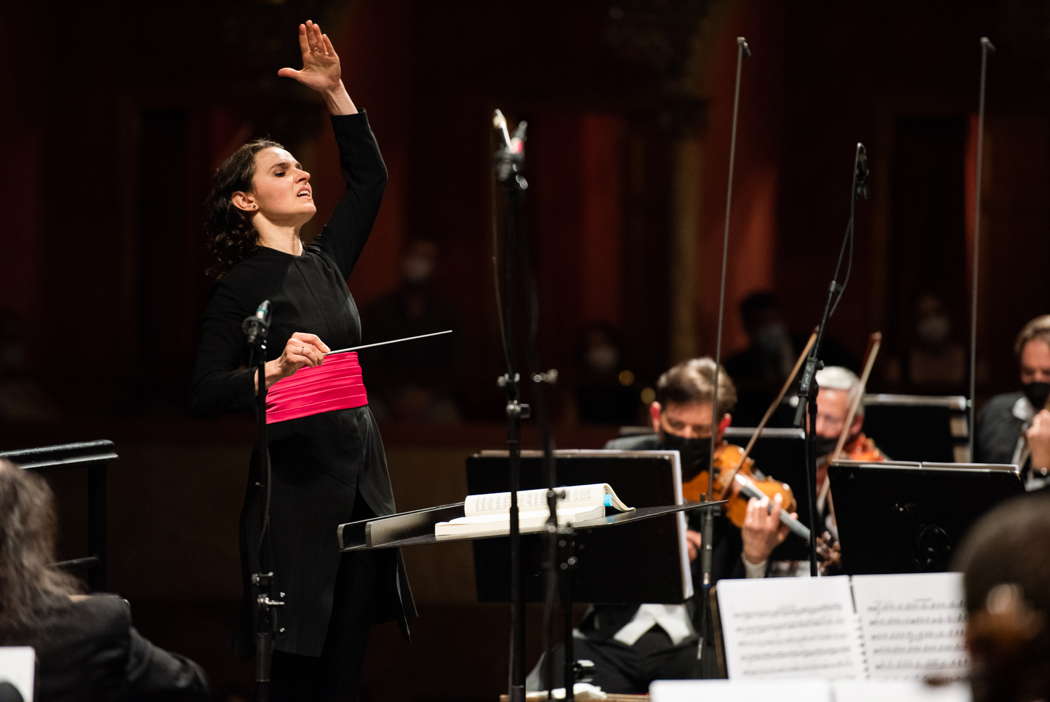
Oksana Lyniv conducting in Rome. Photo © 2021 Fabrizio Sansoni
Tchaikovsky wrote his Symphony No 1 in G minor just after he accepted a professorship at the Moscow Conservatory: it is the composer's earliest notable work. The composer's brother Modest claimed this work cost Tchaikovsky more labour and suffering than any of his other works. Even so, he remained fond of it, writing to his patroness Nadezhda von Meck in 1883 that 'although it is in many ways very immature, yet fundamentally it has more substance and is better than any of my other more mature works.' He dedicated the symphony to Nikolai Rubinstein.
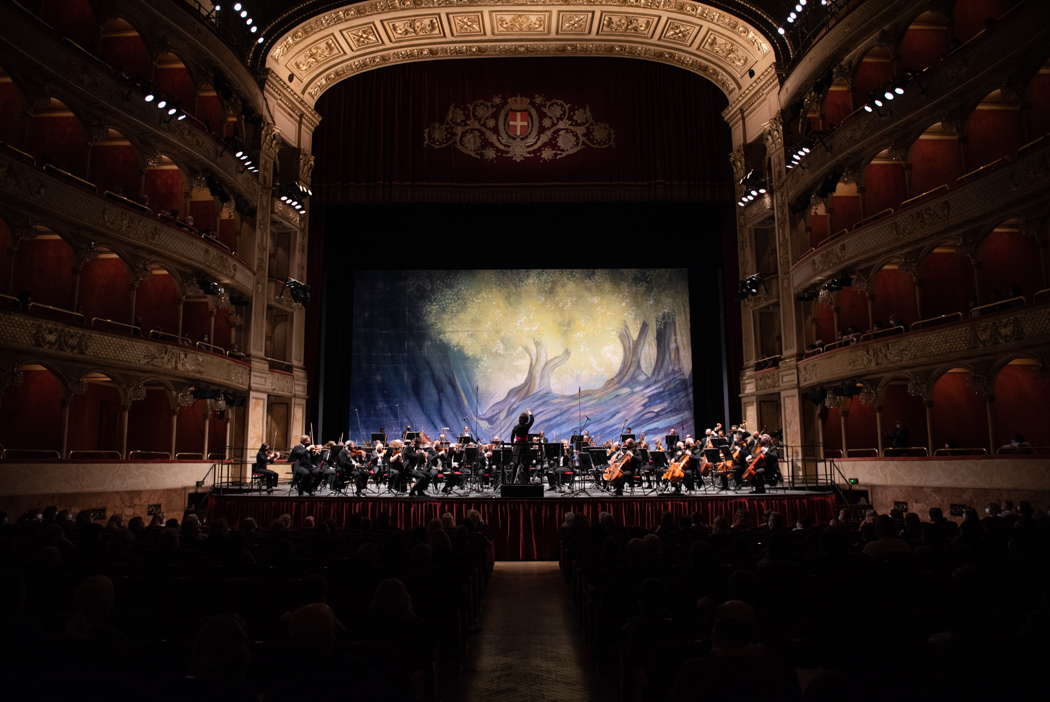
Oksana Lyniv conducting Tchaikovsky in Rome. Photo © 2021 Fabrizio Sansoni
It is a descriptive symphony, and Oksana Lyniv emphasized this aspect as the score reminded her of his native Ukraine with long winters and a beautiful landscape. In the first movement, Allegro tranquillo in G minor, she emphasized the melodic aspects. In the second movement, Adagio cantabile in E flat major, her conducting stressed the monothematic structure, based on subtle variations on a single theme. In the third movement, Scherzo, she increased the tempo to wrap the audience in a whole line of orchestral waltzes. In the fourth and final movement, Andante lugubre - Allegro maestoso (G minor to G major), Oksana Lyniv uncovered the folk song on which the score is based and stressed the ending with a vigorous coda.
The audience responded with accolades and ovations.
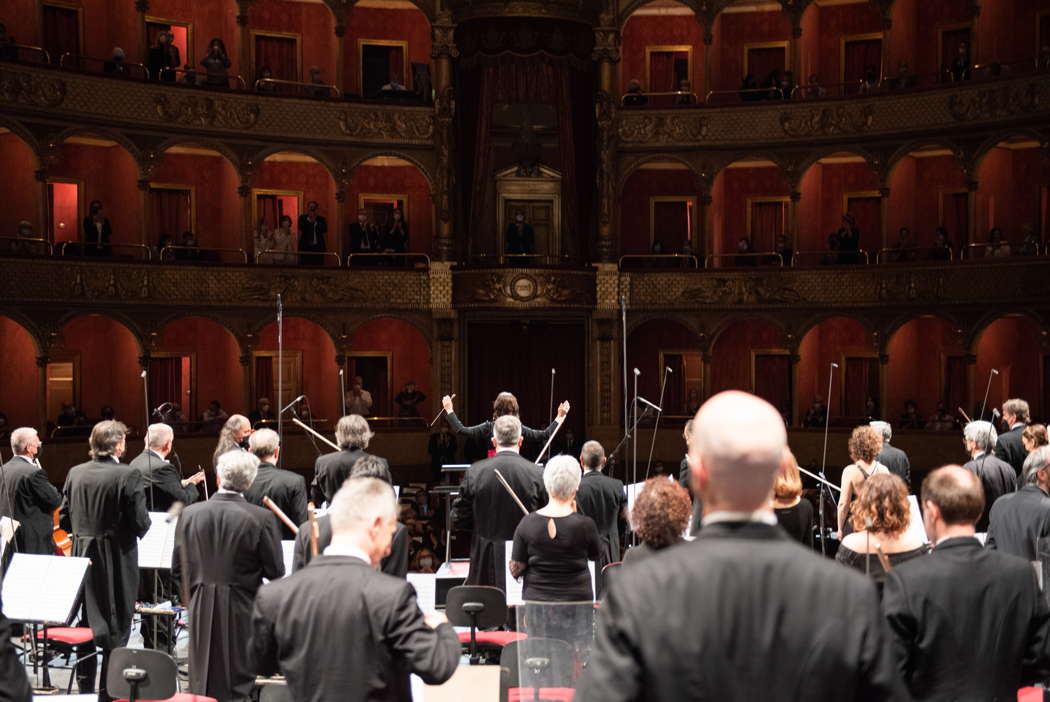
Applause for Oksana Lyniv and the Teatro dell'Opera di Roma orchestra. Photo © 2021 Fabrizio Sansoni
The Opera and Ballet summer season will include new productions of Il Trovatore and Bohème, a revival of Madame Butterfly, Verdi's Requiem, Swan Lake and the dance group 'Roberto Bolle and Friends'. A very rich programme in a few weeks.
Copyright © 26 May 2021
Giuseppe Pennisi,
Rome, Italy



